James Gilmour: A Biographical Sketch
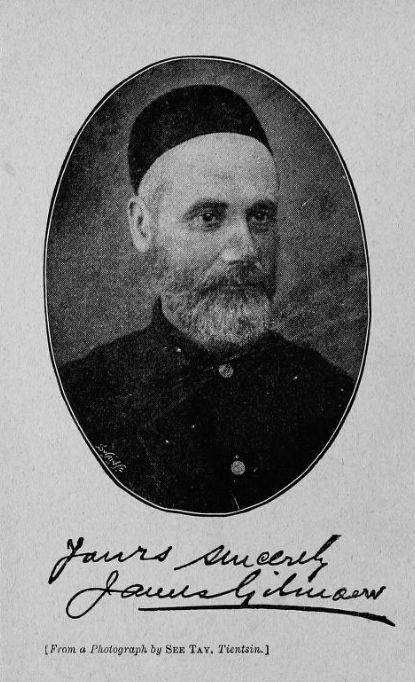
James Gilmour (1843-1891), was a Scottish Protestant missionary who served in China and Mongolia with the London Missionary Society.
His Early Days and Education
He was raised in a comfortable and deeply pious home, where his mother read him stories of missionaries and his father carefully led out in daily worships. Full of life and fun, he enjoyed other young people, but also enjoyed exploring the hills and woods by himself.
He attended the University of Glasgow, where he excelled in Latin and Greek, his secret being the careful use of his time. He graduated in 1867.
Reading the command to go into all the world and preach, and realizing that few people were choosing mission service, he heeded God’s call to volunteer for mission service in Mongolia. In preparation he studied at the Cheshunt Congregational Theological College for a time. While there he came to love the Scriptures and Lost Souls, and began open-air preaching and talking to laborers by the roadside about Christ. He made further preparation for service, including studying Chinese, at the London Missionary Society’s seminary in London.
Mongolia
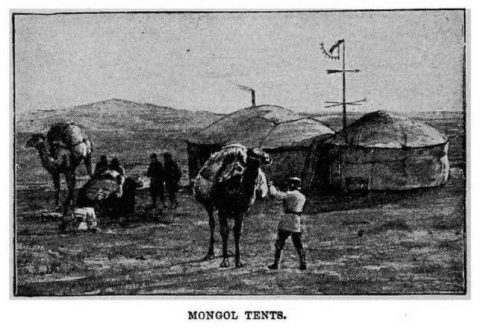
In early February, 1870 he was ordained as a missionary to Mongolia in Edinburgh and left for Mongolia February 22, 1870, on the Diomed. While traveling over, he was made the ship’s chaplain, and afforded himself of the opportunity to talk to the sailors on watch about their salvation. He reached Beijing on May 18, 1870, where his Chinese studies were continued.
It wasn’t too long after his arrival that many missionaries were attacked and massacred. On another occasion a massacre of all the foreigners was planned but did not take place due to rain.
Gilmour set out for Mongolia in August of 1870. Upon arriving he began moving among the people to learn vocabulary. Detained due to passport issues, he found a home with a Scottish trader. He also hired a teacher to help with his language studies but did not advance much. For three months he lived with a devout praying Mongolian and gained wonderful insights into the minds and hearts of the Mongolian people. He also rapidly learned the language. Within one year he could read the Bible in Mongolian and do some writing of the language.
"The place was as beautiful to me as the gate of heaven, and the words of the confession of Christ from out the cloud of smoke were as inspiring to me as if they had been spoken by an angel from out the cloud of glory.”
During the summer of 1872 he visited Wutai Shan with Joseph Edkins, another missionary, and encountered drunkenness, indebtedness and natives who had an insatiable desire to borrow. There he endured many hardships, including walking to save the cost of riding a camel, and using his personal dwelling as a chapel and medical clinic. In spite of much activity, after four years he could not point to a single convert, let alone any one interested in Christianity, as the result of his endeavors.
Emily Prankard
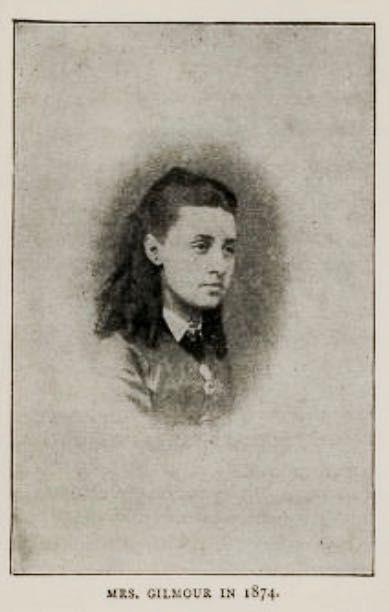
Emily Prankard came to Gilmour’s attention as a result of his seeing her picture in the home of Samuel Meech and his wife, his place of refuge in Beijing. He had already been earnestly speaking to God about obtaining a wife, and requested Mrs. Meech’s permission to correspond with her sister Emily. His first letter included a proposal, which was accepted! He had not seen her in person, nor corresponded with her previously, but he felt confident that God would send her if she was right, and prevent her from coming if she was not right. Emily proved to be an ideal companion, and joined Gilmour in many challenging endeavors over the course of eleven very happy years.
Their first major trip together lasted 158 days, during which time she quickly picked up the language. They were both happy to return to their base and take up other work, which for Gilmour included two books—one on Daniel and the other on the plan of salvation.
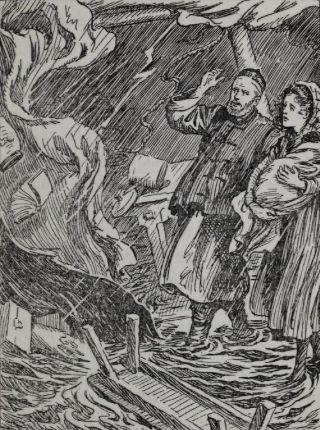
Gilmour's Ministry
Gilmour was a very effective speaker and would share simple homilies that were full of illustrations of his own life, with much direct earnestness. He also made home visits and sold Bibles as he was able. He found two elements of his ministry were especially significant: singing and working with the people's health needs.
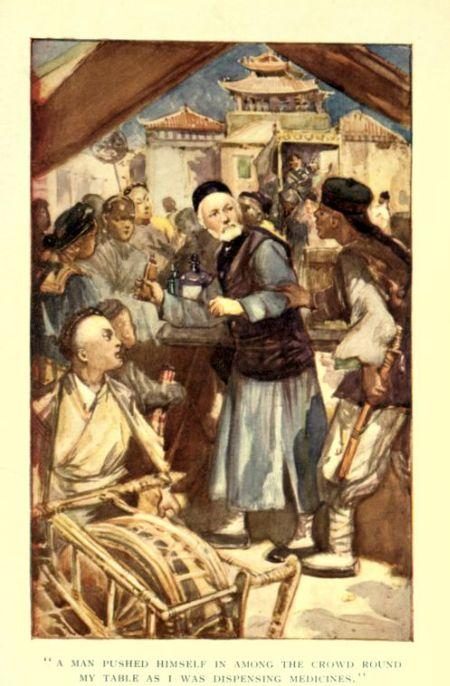
Furlough in England
In 1882 they traveled back to England, where he published Among the Mongols. While there, his main message when preaching in churches was to solicit prayer for more missionaries. He was also a very careful Sabbath keeper, refusing to ride a car or bus on the Lord’s day, and once walked 12 miles to hear Charles Spurgeon, a famous preacher.
First Fruit
In early 1884, in the course of one of his more remarkable trips, he saw the first fruit of his ministry. While pressing the claims of Christ on a group of Lama’s in a smoke-filled room, a layman entered and stirred up the fire, vastly increasing the smoke in the room, and listening all the while to Gilmour’s admonitions through the haze of the smoke-filled room. Suddenly the layman's voice came through the haze to Gilmore, explaining he had been learning about Christ for two months and was ready to become a Christian. Commenting on the experience, Gilmour said, “The place was as beautiful to me as the gate of heaven, and the words of the confession of Christ from out the cloud of smoke were as inspiring to me as if they had been spoken by an angel from out the cloud of glory.” As a result of this, Gilmour decided that personal work was the most effective way of reaching the people, and spent much of his time in personal visitation from early till late.
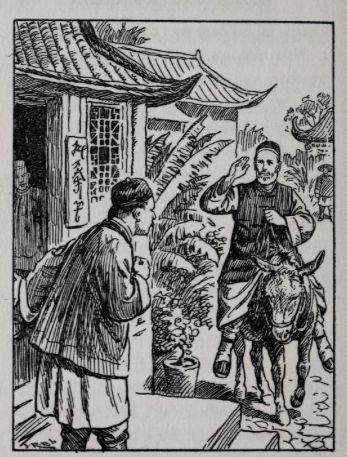
Emily became sick in 1885 and died September 19, 1885. They had been serving together for 11 years.
His Views
Regarding his views, Gilmour included abstinence from tobacco, opium and whiskey among his conditions for church membership. He continued to travel on foot to save money, which sometimes meant he was refused admittance to inns because he appeared to be a tramp. He accordingly hired a donkey to carry his baggage to gain more respectability. The inconsistencies of other missionaries made his work harder, but he continued undaunted. His occasional bouts with depression brought calls for prayer and sympathy from the home church. He also became a vegetarian to aid in his soul-winning work. He dressed like a merchant, ate porridge in the streets like the natives, and kept his expenses to about 6 cents a day. When ministering, he would work from early till late, healing, preaching, selling books and talking to those asking questions. In one eight month period he saw 6,000 patients, sold 3,000 books, distributed 4,500 tracts, preached to 24,000 people, and traveled 1,860 miles. For all of this effort only two individuals confessed Christ.
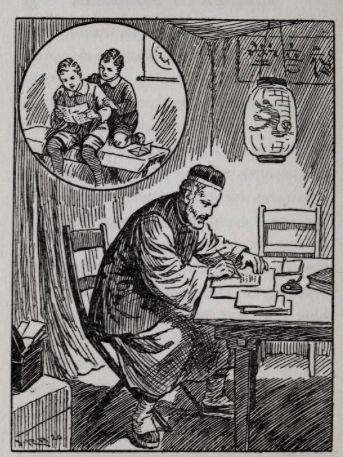
When an assistant was finally sent to help Gilmour, the first thing the assistant did was to send Gilmour home, where friends did not recognize him because he was so thin. While in England he was able to enjoy his boys who had been sent back to England after Emily’s death.
He later returned to Mongolia, where he took up the same kind of work.
In April of 1891 he attended the North China District Committee of the London Missionary Society. There he was honored, made chairman, and was a guest of Dr. Roberts. Suddenly he was stricken with the most virulent form of Typhoid Fever and expired on May 21, 1891.